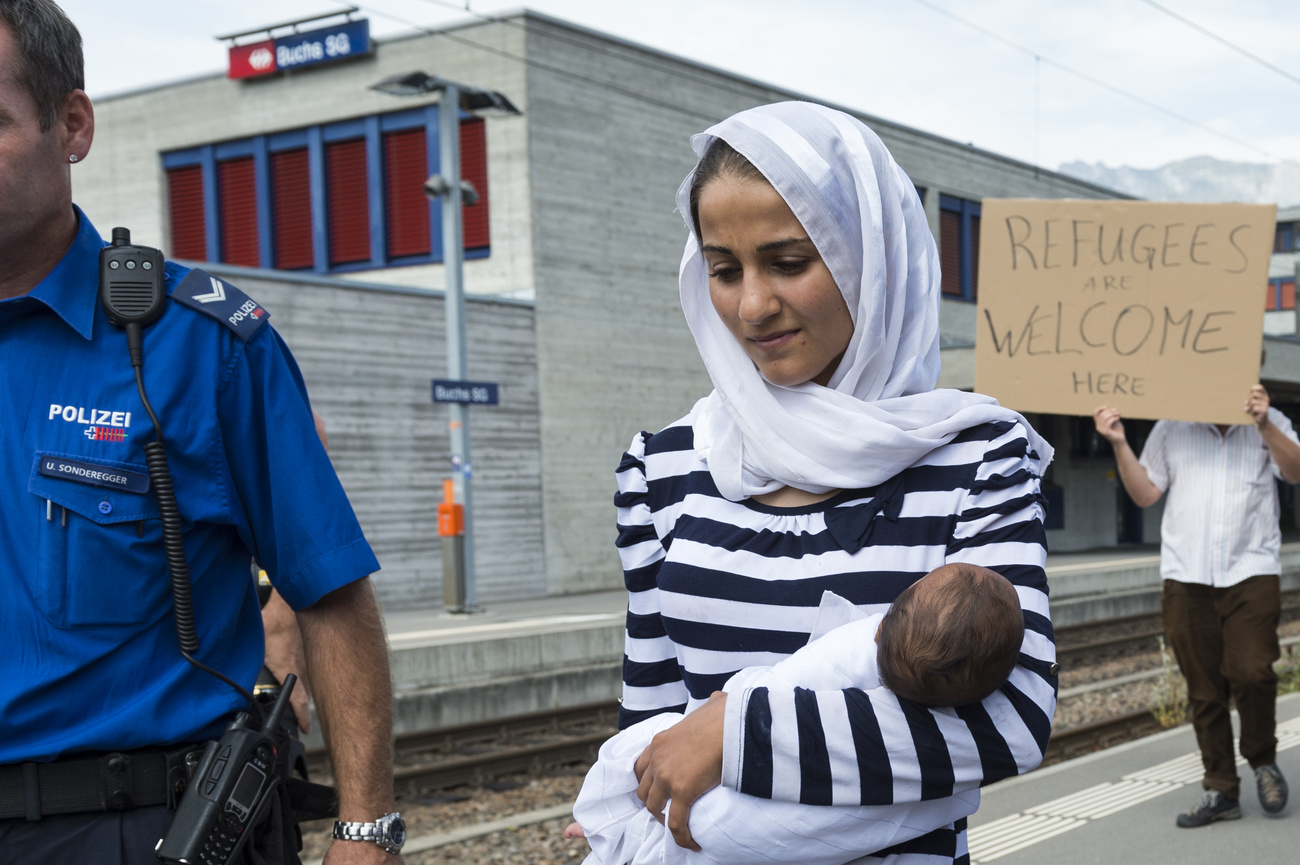
‘Switzerland is violating the Dublin accords by letting migrants pass through’

Although Switzerland is mainly a transit country for migrants, the situation should prompt the government to work out a common migration policy with its neighbours, says Etienne Piguet, vice-president of the Federal Commission on Migration.
Europe is having to deal with a new influx of migrants. The number of irregular crossings into the European Union has reached its highest level since 2016, the European border security agency, Frontex, said in mid-October.
The consequence for Switzerland: nearly 700 people are arriving every week at its eastern border via the Balkans – about three times as many as last winter. Although applications for refugee status have increased, most of these migrants don’t have any desire to stay in Switzerland. They want to continue on to France or Britain.
Etienne Piguet, a specialist on borders and migration flows, analyses the situation.
SWI swissinfo.ch: Should Europe and Switzerland expect a fresh wave of migration as in 2015?
Etienne Piguet: We’re seeing a resumption of significant population displacement, which could increase further. On the other hand, we’re unlikely to see a repeat of the situation in 2015. The situation back then developed very rapidly, simultaneously in the countries of origin, with a worsening of the crisis in Syria, as well as in the transit countries and in Europe, with Germany and Sweden signalling they were open. Those three factors came together to cause a major movement of people.
SWI: What factors explain the rise in migrants coming to Europe?
E.P.: On the one hand, countries like Afghanistan are in chronic crises that just go on or get worse. In parallel, there is the attitude of transit countries, who play their own games with opening and closing borders for geopolitical reasons. I’m thinking of Turkey, and maybe Serbia too. There was an extreme case of this in Belarus where they were ferrying migrants to the Polish border in November 2021. There’s also the post-Covid effect. The lifting of most restrictions prompts populations that had been blocked to try their luck again.
The Swiss federal government’s accommodation facilities for asylum seekers are overcrowded. The facilities are struggling to cope with the increasing number of asylum applications, even though the State Secretariat for Migration (SEM) is regularly opening new accommodation . To ensure there are enough places, some people will be transferred to the cantons earlier than before, the SEM said on October 25.
The cantons and the SEM are expecting “a large influx of people from Ukraine”, but not “other migratory flows”, which turned out to be “greater than we imagined”, said Florence Nater, the Neuchâtel state councillor in charge of social cohesion and employment, interviewed by Swiss public television, RTS. (source: Keystone-ATS)
SWI: The number of migrants arriving at the eastern Swiss border is on the rise. Who are these people?
E.P.: There are several different kinds of people, mostly from Afghanistan, but also coming from Turkey. The number of Turkish nationals arriving has recently increased markedly. Some of them are coming to ask for asylum in Switzerland, so they are applying for refugee status. It’s not a spectacular increase, though, because many only want to pass through Switzerland on their way to countries they find more attractive. So the situation is a special one, but it really is nothing new. In 2015 we were dealing with large numbers of people wanting to move on to somewhere else.
SWI: A recent investigation by Swiss public television, SRFExternal link, found that Switzerland allows migrants to transit to neighbouring countries instead of sending them back as demanded by the Dublin accords. Is that a problem?
E.P.: It is indeed a problem, although this attitude is understandable. These people don’t want to stay here, and the government doesn’t want them here either. Besides, it’s only humane to let these people transit to where they want to go.
But it remains a fact that by letting people pass through, Switzerland is violating the Dublin accords. It’s a short-sighted strategy, because the situation could change and make people want to stay here. If that were the case, the federal government would certainly be happy to be able to count on European solidarity.
Instead of doing their own thing, states should be aiming at Europe-wide collaboration to manage migration together. That will need reform of the Dublin accords, which are not satisfactory. Given its humanitarian tradition, Switzerland might do something to start a fresh look at the problem. I would love to see a major conference in Geneva on all the problems of asylum in Europe.
SWI: How does the existing system need to be reformed to achieve better cooperation between the nations of Europe in managing migration?
E.P.: First of all there needs to be solidarity on dealing with refugee applications. Countries that get few such applications might be asked to show their solidarity in other ways, say by chipping in financially, as the European Commission has been suggesting. States that aren’t attractive to migrants shouldn’t just sit back and leave others to deal with the situation on their own.

Second, reception conditions need to be streamlined throughout Europe. At present, rates of asylum vary a great deal between states, which is just not acceptable. People fleeing Afghanistan, say, shouldn’t have more chance of being accepted in one country than in another.
SWI: The Swiss government welcomed Ukrainian refugees with open arms, giving them status S. Don’t other population groups deserve the same kind of protection?
E.P.: This issue certainly needs to be discussed. Neither Switzerland nor Europe has laid down criteria to determine what situation should trigger this kind of temporary asylum. In the case of Ukraine, it was a sort of knee-jerk reaction. The government now finds itself having to explain why people from Afghanistan don’t get the same treatment. The criticism is valid.
That said, it’s not just because the Ukrainians are white, Christian or European that we received them with open arms, though that might have had something to do with it. The overriding criterion was the sudden, brutal invasion of the country by Russia. What’s more, the specific situation of Ukrainians travelling out of their country is that they don’t need visas to enter Switzerland or the European Union. So they were already free to come here.
SWI: How will the flow of Ukrainian refugees develop over the next few months?
E.P.: If the current stalemate goes on, there shouldn’t be much increase in the number of Ukrainians arriving in Switzerland. Indeed, there might be as many departures as arrivals. That’s the most likely scenario. But if the situation turned really bad with the collapse of vital infrastructure in Ukraine, we could expect a renewed exodus.
Translated from French by Terence MacNamee

More
Switzerland triggers unprecedented special status for Ukrainian refugees

In compliance with the JTI standards
More: SWI swissinfo.ch certified by the Journalism Trust Initiative

































You can find an overview of ongoing debates with our journalists here . Please join us!
If you want to start a conversation about a topic raised in this article or want to report factual errors, email us at english@swissinfo.ch.